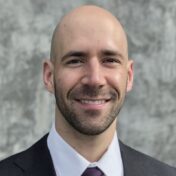CHERISH Welcomes Pilot Grant Recipients to Advance the Treatment of Substance Use Disorders, HCV, and HIV

Meet the ninth cohort of early-career investigators from the states of California, Texas, and Washington.
CHERISH awarded each investigator up to $20,000 for a pilot study that focuses on conducting health economics research in substance use, hepatitis C virus (HCV), and HIV. This year, CHERISH also encouraged applicants to integrate drug overdose prevention, the syndemics of substance use, HIV, HCV, and related comorbidities, harm reduction and recovery support strategies, contingency management, and/or implementation science into their pilot investigation.
Read on to learn about the awardees and their pilot projects.
Thomas J. Bottyan, MD

Thomas J. Bottyan is a board-certified addiction psychiatrist with research and clinical experience in the treatment of substance use disorders and quality improvement. He is a volunteer clinical faculty member at the University of California, the site director for the UC Davis Addiction Medicine Fellowship, and Director of Outpatient Psychiatry Education in the Northern California Veterans Affairs (VA) Health Care System. His involvement in projects related to improving the accessibility of contingency management paved way to his awarded project, “Factors Associated with the Utilization of Contingency Management in Real-World Settings.”
Contingency management is a remarkably effective and underutilized treatment for substance use disorders. While there is significant research supporting the efficacy of contingency management, most findings on patient and site level characteristics are from clinical studies. There are limitations generalizing those results outside of research settings.
Thomas Bottyan
Through the CHERISH pilot grant, Bottyan and his co-investigators aim to identify program-level variables associated with greater enrollment into contingency management interventions and patient-level factors associated with utilization of contingency management for stimulant use disorders in the VA system. Additionally, Bottyan seeks to further develop competency in analyzing databases and gain experience in using health information systems to improve clinical care for people who use substances.
Based in Sacramento, California, Bottyan is a fan of water sports, mostly kayaking and open-water swimming. “A good day is any day on the water, pool, lake, or river, but I am also partial to just reading on the beach. I’ve slowly been building up my ‘land legs’ and don’t mind a good hike or trail run either,” he said.
Sierra Julia Castedo de Martell, PhD, MPH

Sierra Julia Castedo de Martell is a Postdoctoral Research Fellow with the Justice-Involved and Emerging Adult Populations (JEAP) Initiative and Lighthouse Institute at Chestnut Health Systems. She is a person in long-term recovery from substance use disorder and her research focuses on economic evaluations of peer-driven substance use interventions, the accessibility of economic evaluation information, and peer workforce development. After completing two cost-effectiveness analyses of peer-driven collegiate recovery programs and long-term peer recovery support services, she applied for the CHERISH pilot grant to take her research further and contribute to future economic evaluations of recovery-oriented interventions.
For the past two decades, people with personal substance use disorder experience have increasingly been integrated into the system of care as peer workers delivering peer-driven substance use and recovery interventions, but there is a paucity of health economics research on such interventions.
Sierra Julia Castedo de Martell
“A pilot study I recently completed found that long-term peer recovery support services are cost-effective compared to specialty SUD treatment under a wide variety of conditions. However, we used a limited approach for the analyses because I could not identify a good estimate of a recovery utility available in the literature,” she said.
Her pilot study, “Refinement of recovery utility weight estimation from the National Recovery Survey,” aims to develop robust and accurate estimates that integrate quality-of-life measures for recovery that may vary by different individual characteristics such as recovery phase, age, and marginalized identity, and that can be used widely by recovery researchers. “As the evidence base for recovery support interventions grows the need for economic evaluations of these interventions is pressing, but it cannot be adequately met without refining this key parameter,” she said.
Castedo de Martell lives in Bastrop, Texas, a small town outside of Austin, with her husband and 3-year-old son. A perfect day for her family includes a walk through Fisherman’s Park along the Colorado River, a treat and coffee from Tough Cookie bakery, a stroll back to play at the playground, followed by a nap for everyone, and an afternoon swim at the Colorado River Refuge.
Bulat Idrisov MD, MSc

Bulat Idrisov is a PhD candidate studying health services research at the University of Washington School of Public Health. He previously connected with Sean M. Murphy in 2017 through a request to the CHERISH Consultation Service to assist in strengthening his analysis of the cost-effectiveness of methadone treatment in Russia; the paper was later published in the Journal of Substance Abuse Treatment, Prevention, and Policy.
As his focus shifted from global health to U.S. healthcare, Idrisov realized that the CHERISH pilot grant was the ideal opportunity to explore his research on the spending effectiveness on HIV and SUD and build his skills in large-scale data analysis and methodologies to examine spending effectiveness.
His pilot study, “U.S. Health Care Spending on HIV, HCV and Substance Use Care from 2010 to 2019: Variation by Area and Demographics,” aims to dissect healthcare expenditure across different states, payers, and demographic groups. The awarded project was born out of his past experiences in HIV and SUD work.
HIV and SUD are among the leading contributors to the burden of disease in the U.S. and result in substantial costs. This is particularly concerning due to their synergistic interaction and complexity of care, making it crucial to optimize resource allocation and maximize benefits.
Bulat Idrisov
With the support of his co-investigators at the University of Washington, he plans to use extensive data from the Global Burden of Disease project to shed light on the financing requirements of addressing syndemic health challenges and to improve our understanding of the real-world relationship between spending and health outcomes over time.
Idrisov is currently based in Seattle, Washington, where a day well spent is all about balance. “As my first cup of coffee kicks in, I strive to maintain that balance throughout the day – neither overly caffeinated nor under-caffeinated – to stay focused. An ideal day isn’t too sunny to lure me away from work, nor is it too rainy. That way, my wife and I can take evening strolls along Portage Bay or through the University of Washington campus.”